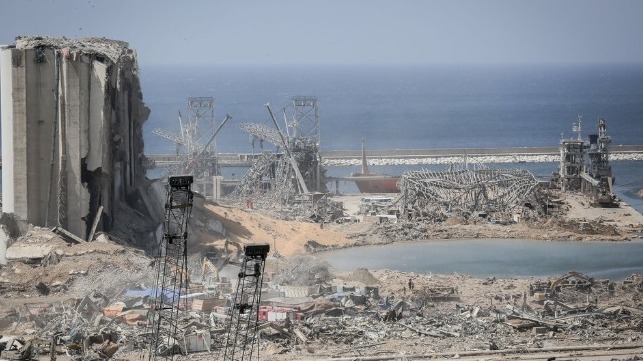Lebanon Seeks Arrest of Owner, Master of Explosives-Laden Freighter

Lebanese investigators have requested the arrest of the owner and the captain of the freighter Rhosus. The Rhosus arrived in Beirut in 2013 with a cargo of explosives-grade ammonium nitrate, and after the owner abandoned the crew and the ship over unpaid port fees, Lebanese officials offloaded the cargo and left it in a minimally-guarded warehouse for six years. It detonated on August 4, 2020, killing 193 people and destroying a large segment of Beirut's waterfront. The blast ranked among the largest non-nuclear explosions in history.
To date, the investigation has led to the arrest of more than two dozen people, including the former head of Lebanese customs. On Thursday, investigating judge Fadi Sawwan expanded the inquiry, asking state prosecutors to work through Interpol to arrest the Rhosus' owner and captain.
The vessel belonged to Russian national Igor Grechushkin, and the ship was captained by Russian mariner Boris Prokoshev. Grechushkin already underwent questioning by Cypriot officials after a Lebanese request.
The explosives-grade cargo of ammonium nitrate arrived in Beirut via a circuitious path. According to a 2016 account by two Lebanese maritime lawyers, Charbel Dagher and Christine Maksoud, the Moldovan-flagged freighter Rhosus made a brief call at the port in September 2013. Rhosus was carrying the cargo in question, and she was bound for Mozambique. However, she was detained by Lebanese officials, and her owners - and the cargo owner - abandoned Rhosus and her crew. Suppliers filed suit to arrest and sell the vessel in order to repay its debts. In the interim,"owing to the risks associated with retaining the ammonium nitrate on board the vessel, the port authorities discharged the cargo onto the port’s warehouses," Dagher and Maksoud wrote.
The decisionmaking behind the cargo's continued presence on the Port of Beirut's grain pier - adjacent to a warehousing area and a downtown residential district - is less known. At some point after the cargo's arrival on shore in 2014, a large consignment of fireworks was stored next to it. Initial reports indicate that court-ordered hot work on the warehouse doors led to a fire and the subsequent explosion.
